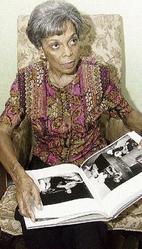One of the artistes in these dance masterpieces was Barbara Requa (born Grant). It was at her alma mater St Andrew High School for Girls - that her career in dancing would start to take shape.
She maintains that she always had two real passions: teaching and dancing. So she found a way to do both. After high school, she went to study physical education in England and it was under the tutelage of Austrian Rudolph Laban (who preached a methodology of teaching dance), that she finally mapped her way forward. She returned to her alma mater as a 'phys ed' teacher and dance instructor.
"That (Laban's teaching) was really enlightening to me and I thought that is the perfect way for young people to start learning dance. I basically adapted those methods."
Requa introduced that methodology in her dance classes.
She believes strongly in the philosophy that this method brings.
"The idea is that dance is an important thing for children to do and every child should dance or have the opportunity to dance. It doesn't apply that much to Jamaica because all our children dance, which is a completely different thing than what happens in other countries," she says. But even though our children dance naturally, she says they are hardly taught it, at that age, something she sought to change.
"I must confess that I was very pleased to be part of the development of the CXC syllabus for dance which has been used for about the past four or five years," she says. She notes that her greatest achievement is what she's passed on wherever she's taught.
"I think it was influencing the people who are working with me to accept my choices and to expand on them. I feel that I've touched some lives and for me that's important," she said.
The way she transcends dance is indicative of the way she was taught by the legendary Ivy Baxter. "She was a very brilliant woman," Requa remembers. "She had vision and she would motivate you, but she really was kind of an eccentric person in her own way," she jokes. She also credits Baxter for trying different things.
Birth of the Jamaica School of Dance

Requa and Sheila Barnett (both physical education specialists) started a school and after about four years, the National Dance Theatre Company (NDTC), which they helped to create, wanted its own school, so the women linked their school with Bert Rose. They moved to the Little Theatre shed and the Jamaica School of Dance begun with five students. At the school, they developed the core curriculum which is still used today.
The school would eventually become a division of the Edna Manley School of the Visual and Performing Arts. She held various positions within the school, including acting principal when Rheima Scarlett (now Hall) retired.
She still teaches at the School of Dance and admits that it (teaching) is harder now.
"Some of them drop out because it's very challenging to study dance, but nowadays there are so many things happening. Other than school, some of them are dancing in companies and they get burned out or get injuries and when you get injured you lose time," she points out. She states that she enjoys teaching young men, especially because they have a lot of energy and like to work.
Flair quizzed her about what she thought about the state of Jamaican dance. "It's better in that there are more people participating. There are a lot of groups and the whole dance scene is huge. We really are a dancing nation," she says.
Her living room is filled with books on the arts and exponents of the arts, while paintings from greats such as Kapo, Alexander Cooper and Edna Manley hang from her walls.
Elephant collection
Her living room also has part of her cache of elephants, a hobby she started some years ago. She has elephants from as close by as other Caribbean islands to as far away as New Zealand and Australia. But even without travelling miles across the ocean, her flair for plants is satisfied just by stepping into her frontyard. Orchids, palms and plumbagos are all part of her collection although she says she has a special place for African violets as well.
So what next? She has written a book outlining the methodology and steps to be used in the teaching of dance. She is looking forward to the conference of 'Dance and the Child International', which is an organisation which promotes the growth and development of dance for children internationally. Jamaica will host the 2009 edition. She also vows to continue working with her School of Dance Alumni Fund which she started 10 years ago.
Anything to keep Jamaica dancing.
daviot.kelly@gleanerjm.com.

Barbara Requa shares pictures from her past achievements.Andrew Smith/Photography Editor -
Flair continues our series of profiles on the nominees for the inaugural First Global Bank Vision award.

